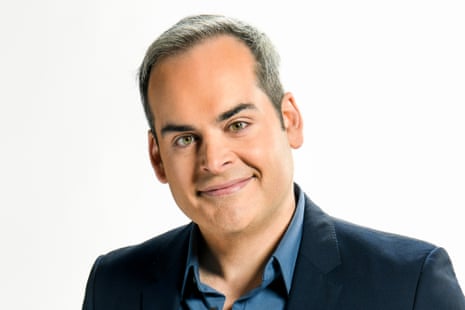An award-winning reporter for a major US news broadcaster recently faced discrimination from the Roman Catholic high school he attended while growing up in Louisiana because he is gay, he has said.
David Begnaud – the lead national correspondent for the television news program CBS Mornings – encountered anti-gay discrimination when he traveled to Teurlings Catholic high school to report a profile on his freshman English teacher, Josette Surratt, he wrote in an opinion column on Nola.com. Begnaud said the school’s current administration made him feel unwelcome at the campus because it didn’t want students to think his sexuality was acceptable – treatment that is not consistent with how Pope Francis has been trying to make the worldwide Catholic church more welcoming to LGBTQ+ community members.
Begnaud’s column explained that Surratt had helped him understand himself as a student who was gay, had Tourette syndrome and endured bullying, and that he wanted to share the pair’s personal story with his program’s viewers.
Surratt, Begnaud said, helped him “become the person [he] was meant to be”.
However, while Surratt “was genuinely thrilled to be the subject of the story”, she told her former student that it would be better if her interview were conducted off the campus of his old Lafayette, Louisiana, school. Begnaud was also told he could only record video of the campus once it was empty – a condition to which he agreed because he had believed Teurlings administrators simply didn’t want the presence of a camera crew to disrupt the school day.
But then, Begnaud wrote, “I got a phone call that took me right back to my childhood at the school where I’d often felt like an outcast. The caller told me the reason the school restricted my video recording was that the school’s chancellor, Father Kyle White, was concerned that allowing me on campus might negatively affect the image of the Catholic school and suggest that it approved of my sexuality.
“Father White, the caller said, didn’t want students to get the impression that being gay is OK.”
White also worried that the piece on Surratt would center on Begnaud’s sexuality. The profile mentioned it, but, the journalist said, the report was primarily “about this extraordinary teacher and human being”.
Begnaud said he chose to publish details about his recent experience at Teurlings out of concern for the school’s students, whether they are “straight, gay or anything else”.
“If the school is creating an environment in which gay students are treated like outsiders and straight students are led to believe that this is how the church would have it, it is not,” Begnaud wrote.
Begnaud alluded to how the pope recently allowed Catholic priests to bless same-sex couples, changing longstanding Vatican policy.
The Teurlings alum called on the school to be similarly welcoming.
“I am asking for school leaders to have courage,” said Begnaud, who donates money to Teurlings for a scholarship to be awarded annually to a student who embodies the quality of courage.
after newsletter promotion
“It is a time to heal. And a time to love.”
Some of Begnaud’s most affecting work saw him bring international attention to Puerto Rico and the neglectful US federal response after Hurricane Maria devastated the island in 2017. His reporting on Maria’s aftermath earned him the George Polk award for public service, one of journalism’s most prestigious prizes.
Teurlings didn’t respond to a request for comment on Begnaud’s Nola.com column.
The Lafayette Catholic diocese to which Teurlings belongs has been making headlines in Louisiana for going to the state’s supreme court and challenging the constitutionality of a law that retroactively and temporarily eliminated filing deadlines for lawsuits seeking damages for childhood sexual abuse.
The statute being challenged by Lafayette’s diocese wasn’t exclusively for clerical abuse victims, though it prompted many new cases of that nature against Catholic institutions in Louisiana.
The law is similar to the one in New York that allowed E Jean Carroll to sue Donald Trump over accusations that he sexually abused her in a dressing room in the mid-1990s before defaming her, claims that have resulted in judgments ordering the former president to pay the writer nearly $90m in damages.
